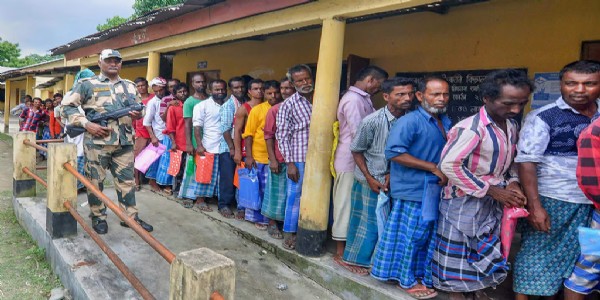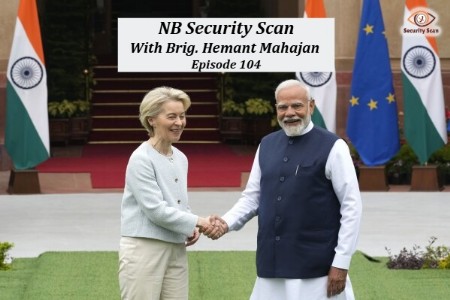#SecurityScan 81 | 'China & India: No longer "bhai-bhai," but "bye-bye"' and much more
Participation in international defense projects ensures that Japan stays on the cutting edge of technology innovation, as well as remains a reliable and credible ally and security partner.
Total Views | 1024
This article is a summary of important events that have taken place in last one week affecting, India's national security .
#COUNTERING CHINESE MULTI DOMAIN , GREYZONE, HIGH BREED WARFARE
Chinese navy live-fire drills a ‘timely and forceful response’ to Philippines’ tilt to US
PLA warships simulate attacks on ‘armed enemy fishing boats’ in South China Sea ahead of annual Balikatan military exercises
War games mimicking ‘complex battlefield environments’ show Beijing wants to bolster territorial claims in recent maritime disputes.
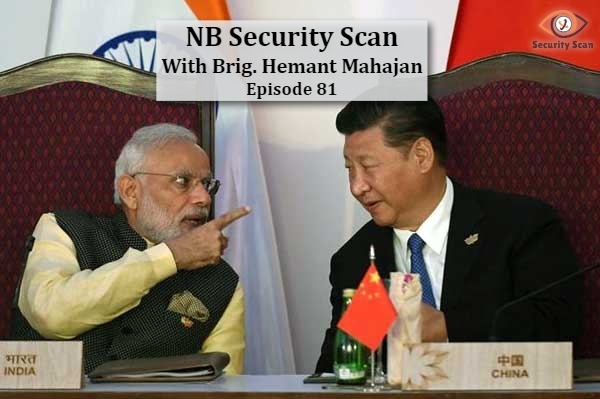
Taiwan races to catch up with mainland China’s military drone capabilities
As the island’s defence ministry lays out ambitious plans for local and US-made drones, observers warn it is at least five years behind
Operator training and recruitment as well as a joint effort by defence and civilian sectors to boost mass production capacity will be crucial.
Will China’s fourth aircraft carrier steer towards troubled waters in Asia and challenge the US Navy?
The US Navy has an edge over its Chinese counterparts in terms of firepower and access to its supply bases in the region, analysts say
Smaller Asian countries can learn from the Ukraine war and deploy assets such as drones and sea mines to counter China’s expanding naval presence.
Asia’s terrorism surge: from Pakistan to Russia, Isis-K awakens sleeper cells – as Chinese interests come under fire
Using Afghanistan as a base, Isis cells have hit targets in Russia, Pakistan, Iran and Turkey this year, spurred on by outrage over Israel’s Gaza war
Pakistan blames the Afghan Taliban for its inaction against the group, as well as the Baloch militants striking Chinese interests in South Asia.
First U.S.-Japan-Philippines trilateral to address China's 'gray zone' tactics,Leaders seek to deepen economic ties as Beijing tests American treaty commitments
U.S. President Joe Biden will add to his collection of "mini lateral" gatherings of allies and partners when he hosts Japanese Prime Minister Fumio Kishida and Philippine President Ferdinand Marcos Jr. in Washington on April 11 for their first trilateral summit.
Unlike the Quad grouping of the U.S., Japan, India and Australia -- and unlike the AUKUS security partnership of the Australia, the U.K. and the U.S. -- the new trilateral does not have an announced name or acronym.
Chinese state media stoked allegation Taiwan President Tsai would flee war
Taiwan’s outgoing President Tsai Ing-wen plans to flee in an American plane if war erupts with China, according to an unsubstantiated report first published in 2021 and echoed in the run-up to the island’s January 2024 general election.
According to another story, Ms Tsai gave her confidantes VIP “run away” passes.
Japan greenlights its defense industry
The nation opens doors to military equipment exports while trying to honor its pacifist ideals
Japan is slowly unshackling its defense industries. The Cabinet of Prime Minister Fumio Kishida recently agreed to ease defense equipment transfer rules to allow exports of next-generation fighter jets it is jointly developing with the United Kingdom and Italy. This follows other steps that allow Japanese companies to participate more fully in the global market for defense equipment.
It is the right decision. Japan must loosen restrictions that have undercut the ability of its companies to compete in this sector. There are limits, however, to how far liberalization should go. Participation in international defense projects ensures that Japan stays on the cutting edge of technology innovation, as well as remains a reliable and credible ally and security partner.
China and India: No longer "bhai-bhai," but "bye-bye"
China persists in its belligerent stance, exemplified once more by its recent release of a list of names for places in Arunachal Pradesh. This maneuver, however, is mere folly. New Delhi has unequivocally reaffirmed the obvious: the renaming exercise in no manner alters the fact that Arunachal Pradesh has been, is, and will always be an integral part of India. Beijing's assertion of control over the region, which it labels as 'south Tibet,' exists only within the realm of an expansionist fantasy. Moreover, it underscores China's lack of intent to mend ties with India.
While China demands respect for its territorial integrity from the international community, it fails to reciprocate this principle in its dealings with other nations. This double standard is evident in the numerous border and maritime disputes it has with neighboring countries. By asserting a claim over Arunachal Pradesh, China reveals its perception of India as a nation amenable to coercion. Therefore, it may be time for India to reassess its commitment to the 'One China' policy, especially as our practical collaboration with the Republic of China, or Taiwan—tragically affected by a massive earthquake yesterday—is expanding.
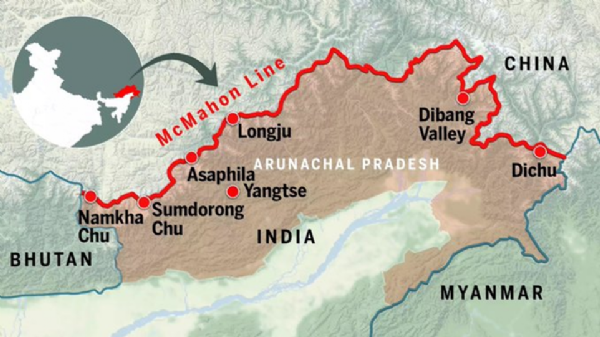
India's stance against China has been evolving. Since 2010, India has refrained from mentioning the 'One China' policy in joint statements and official documents. Beijing's outright rejection of a reciprocal 'One India' policy in 2014 further diminishes the need for New Delhi to navigate this issue delicately. China remains India's strategic rival and a security concern, evident through PLA incursions and other provocations.
New Delhi should explore and facilitate high-level political and technical visits with Taiwan. The latter is a semiconductor giant and India is already seeking bilateral cooperation in this sector. There’s no need to look over our shoulder at Beijing when engaging Taipei. India can start by offering earthquake relief assistance to Taiwan. China cannot dictate our Taiwan policy.
Supply Chain Challenges due to earthquake Opportunity India
The recent earthquake off Taiwan's east coast highlights the risks of concentrating chip-making capacity in one territory. While initial reports suggest no immediate impact on supply chains, the incident underscores the need for diversification. Chipmakers are already accelerating plans to diversify beyond Taiwan due to factors like the Covid outbreak and tensions with China. India, with its ambitions in chip manufacturing, offers an interesting proposition.
‘3-Body Problem’ Is Showcasing China’s Distrust of the West
Science fiction has always been treated with suspicion by Beijing, and this series is no different.
The first scene in the new Netflix series 3-Body Problem opens with a shocking sequence. A prominent scientist is beaten to death by paramilitary Red Guards, a depiction of recent history that still remains taboo in China, playing out a brutal scene from the Cultural Revolution in the 1960s. His crime? A belief in the theory of relativity.
From those very first few moments, it is a wild ride, at times almost hallucinogenic. But there is a wider, more urgent issue the series shines a light on: The China that President Xi Jinping displays to the world is not the only China that exists. It is a complex, multi-layered place — much like the show itself — that often confounds expectations. The Chinese Communist Party has tried to own the definition of what it means to be Chinese, and has been exporting it around the globe. This series showcases a different, stranger world, created by a Chinese author — and audiences around the globe are responding to it.
Countering Internal & External Security Challenges
PROPOGANDA WARFARE-The BBC's bias defeats its purpose and makes it a liability for Britain
BBC is damaging Britain's image by alienating potential allies and projecting an image of entitlement and sanctimony. During a Hard Talk interview, President Irfan Ali of Guyana rebuked BBC interviewer Stephen Sackur, stating that his country engages in significant forest conservation efforts without receiving due credit or compensation while the developed world enjoys the benefits of energy consumption since the industrial revolution. President Ali went on to question whether the BBC is influenced by those who have harmed the environment. This interview quickly went viral, with widespread praise for President Ali as the voice of the Global South. However, the response also reflected anger and disgust towards the BBC for its hypocrisy, colonialist tone, and apparent advocacy for the globalist elite and vested interests.
The BBC, along with a few other Western media outlets such as The New York Times, The Washington Post, Financial Times, and Deutsche Welle, has aligned itself with powerful left-leaning globalist networks that seek to undermine governments unwilling to conform to their agenda. Through its excessive bias, the BBC violates the fundamental principle of Britain's Royal Charter, which defines its "Public Purposes" as providing impartial news and information to help people understand and engage with the world. The BBC has failed to convince the world that it uses British taxpayers' money to deliver "impartial news and information."
The UK's Conservative Party has long criticized the BBC for its strong pro-Labour and pro-left bias. Former Prime Minister Margaret Thatcher famously stated, "I have fought three elections against the BBC and don't want to fight another against it." Indarjit Singh, the head of Britain's Network of Sikh Organisations, criticized stations like BBC Asian Network for hindering integration and social cohesion by allowing communities to isolate themselves. The BBC had halted the broadcast of a show commemorating Sikh Guru Tegh Bahadur, who was beheaded in the 17th century for opposing forced conversions to Islam in India, citing concerns about offending Muslims.
The BBC has faced bans in Russia and China. In India, the BBC has long been perceived as pro-Pakistan.
Recently, the BBC was found guilty of tax evasion and initially tried to portray it as retaliation by the Indian government. However, the BBC later admitted to underreporting Rs 40 crore ($4.8 million) of income in its tax returns. This incident followed a suspiciously timed documentary titled "India: The Modi Question," released before the 2024 elections. Through a series of opinions and innuendos, the documentary attempted to implicate Prime Minister Narendra Modi, in the 2002 Gujarat riots, despite his exoneration by the courts a decade earlier.

The BBC's consistent anti-India and anti-Hindu positions on various issues such as the anti-CAA protests, farmers' agitation, abrogation of Article 370 in Kashmir, Ram Mandir pran pratistha, Leicester riots, or the hijab-in-schools controversy raise the question: is the BBC doing a great disservice to once-Great Britain? The answer seems clear.
The BBC undermines the UK's economy, security, law and order, and demographic future by consistently adopting a left-leaning, pro-immigrant stance. The organization avoids addressing issues of Islamic radicalization and terrorism. Moreover, it damages Britain's by provoking potential allies and appearing as an entitled and sanctimonious attack dog for the UK .
Joe Biden's Letter to Shehbaz Sharif: A Potential Shift in US-Pakistan Relations
A letter from US President Joe Biden to Pakistan's Prime Minister has recently sparked intrigue and speculation regarding the future of US-Pakistan relations. This communication serves as the first official contact between the two leaders, signalling a potential shift in US policy towards Pakistan.
Since assuming office in 2021, President Biden had not engaged directly with either former Prime Minister Imran Khan or his successor, Shahbaz Sharif. The absence of interaction raised questions about the status of bilateral relations.
However, Biden's letter to Prime Minister Shahbaz Sharif, which expresses support and emphasizes the importance of the partnership between the two nations, suggests a change in approach. Despite concerns within Biden's party regarding the legitimacy of Sharif's government, the president chose to extend a hand of cooperation.
The timing of this outreach is significant, especially considering the recent visit of an International Monetary Fund (IMF) team to Pakistan and their agreement to release substantial funds to the government. As the United States plays a dominant role in the IMF, this development indicates a willingness to support Pakistan financially.
The apparent thaw in US-Pakistan relations raises questions about the underlying motivations. One possible factor is Pakistan's reported assistance to Ukraine during its conflict with Russia, which garnered appreciation from Washington. Additionally, the resurgence of threats from terrorist groups in Afghanistan, despite US hopes for stability after withdrawing troops, has refocused attention on regional security.
Experts speculate that Biden's outreach to Pakistan may aim to leverage Islamabad's assistance in containing terrorism, particularly in light of recent attacks by the Islamic State in neighboring countries.
Will this renewed engagement between the United States and Pakistan lead to meaningful collaboration, or will past pitfalls overshadow any potential progress?
Indian Defence exports have witnessed a considerable uptick, even as some bottlenecks need removing
India's defence exports led to a remarkable surge of ₹21,083 crore in 2023-24. This growth, driven by various initiatives and partnerships, underscores the evolving landscape of India's defence industry. 2023-24 has witnessed a big increase, from ₹15,920 crore in 2022-23 to ₹21,083 crore, representing an increase of 32.43%. Notwithstanding the pandemic serving as a dampener, at no stage before the last decade have Indian defence are growing, even though it may not be era of war.
HUMAN SECURITY-Rescue Indians Trapped in Southeast Asia: Cyber Fraud and Job Exploitation
Thousands of Indian nationals find themselves in distressing situations in Myanmar and Cambodia, where they are coerced into committing online fraud and deception. The Ministry of External Affairs has been successful in rescuing approximately 250 Indians from Cambodia and around 30 from Myanmar. These individuals are being lured by organized crime rings, in collusion with unscrupulous agents, who promise them employment in the information technology industry in these countries. However, upon arrival, they are forced to work in cyber fraud centers and compelled to deceive people through phone calls, emails, and WhatsApp messages. In some instances, they even impersonate law enforcement officials to extort money on behalf of their employers.

This alarming trend reinforces the recent statement by Jurgen Stock, the head of Interpol, who highlighted the expansion of organized crime groups during the Covid-19 pandemic. These criminal networks, which have contributed to a surge in human trafficking and cyber scam centers, have transformed into a global network generating an estimated $3 trillion annually. According to Stock, these cyber scam establishments, where staff members are operating under coercion, have enabled crime syndicates to diversify their operations beyond drug trafficking. Similar fraudulent operations are reportedly being conducted in Malaysia and the Philippines, with potential ties to certain Chinese companies.
India, known for its strong ties with ASEAN nations, must intensify efforts to crack down on operators of fraudulent call centers. It is crucial to widely circulate advisories about online and phone scams to all stakeholders. Close coordination and regular exchange of information among governments can prove effective in deterring criminals. Additionally, the distressing reality of Indian nationals seeking employment in countries like Myanmar and Cambodia calls for attention , necessitating corrective measures to prevent skilled young individuals from falling into this vicious trap.
Economic Security-Reserve Bank of India deserves share of credit for economic stability
Country has come long way since it was a 'fragile five' emerging market
Every month, Indian Prime Minister Narendra Modi sits down with his economic advisory board to discuss policy.
The group's discussions held to a straightforward conclusion of late. At a time when geopolitical tensions are high and global financial markets volatile, the best course of action is to refrain from aggressively pursuing growth or easy credit and to hold back from big subsidy increases that could swell both inflation and the government budget deficit.
The Reserve Bank of India, the markets and the prime minister's office are surprisingly in agreement on the need for policy stability even with a national election campaign in full swing and the temptation to offer generous handouts greatest.
This is a considerable achievement for a country that 11 years ago was one of the "fragile five" emerging market economies that Morgan Stanley saw as particularly vulnerable to the impact of potential capital outflows.
That was shortly before Modi's first national election victory. Today, the country whose foreign reserves appeared inadequate then now has around $600 billion banked to cushion any shocks.
India's economy has never looked better. The country is now the world's fastest growing major economy and well outpacing China for the first time.
India is now posting annual growth rates above 7% while China, wrestling with debt, deflation and demographics, will be hard pressed to realize its official target of "about 5%" growth this year. India though does have the advantage of growing from a smaller base, as China's gross domestic product is now about five times larger.
Credit for India's economic outperformance must go both to Modi's government and to the RBI, which has become increasingly technocratic in recent years.
The best any central banker can hope for in many cases is not to be independent of his or her political masters but to be in sync with them. Counterparts in Asia may well look at the RBI with envy, at least at this time
WORLD AT WAR: LESSONS FOR INDIA
The Israel-Iran Shadow War Reaches a Dangerous New Phase
A shadow war between Israel and Iran has shaped the Middle East for decades. Of the many conflicts that have roiled the region, theirs has long been among the most explosive. The two have attacked each other — mostly quietly and in Iran’s case often by proxy — while avoiding an escalation into direct war. But as the fighting between Israel and the Iran-backed Palestinian group Hamas continues and other militant groups supported by Iran join the fray, the shadow war has entered a dangerous new phase.
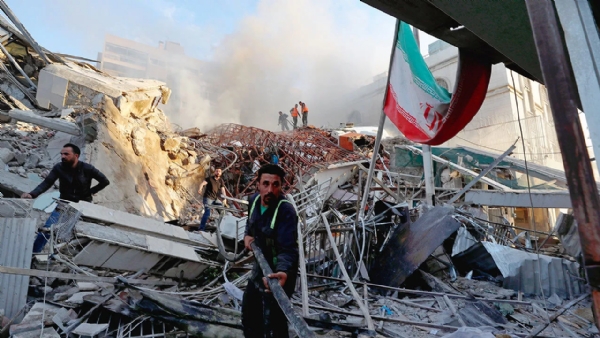
Iranian state TV reported April 1 that an Israeli airstrike targeting the country’s diplomatic buildings in the Syrian capital, Damascus, had killed, among others, a top commander of the Islamic Revolutionary Guard Corps, Iran’s premier security force. It was just the latest deadly strike in recent months on the Revolutionary Guards in Syria that Iran blamed on Israel. On Jan. 15, Iran used missiles to attack what it said was an Israeli spy base in Iraq.
Development of lethal autonomous weapons- Israeli startups hope to export battle-tested AI military tech
Israeli startups are looking to export advanced military technology powered by artificial intelligence whose precision has improved from use in the Israel-Hamas war.
Edge 360, an AI camper system developed by Axon Vision, is installed in armored vehicles currently deployed in Gaza. The system identifies threats from all directions and warns the solider driving the vehicle. It helps speeds up decision-making by conducting analysis normally performed by soldiers.
Axon Vision was formed seven years ago and only started delivering the system to the Israel Defense Force just before the current conflict began in October.
"One of the advantages we have here in Israel with the Israeli army is that we have close relationship," CEO Roy Riftin said in an interview at the company's office in Tel Aviv. "We get feedback all the time."
Axon Vision aims to further enhance the tech and export it. The company is currently conducting market research, betting on global demand for modernizing armored vehicles.
--
Bharati Web




